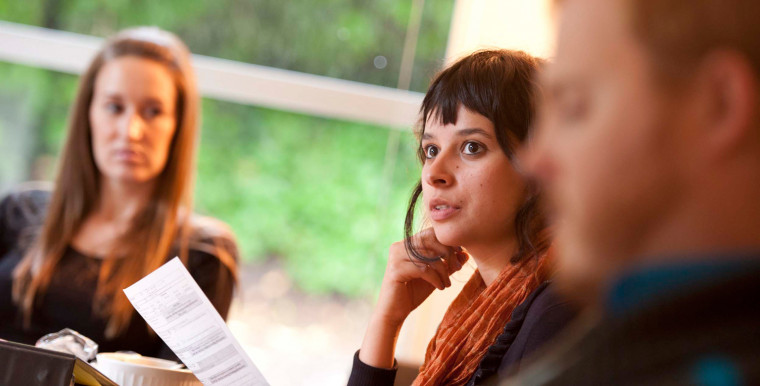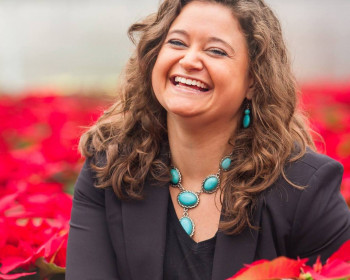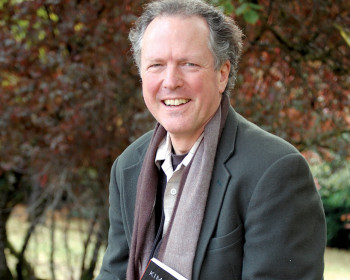Counselors in Training
Open gallery

A sense of calm pervades the Community Counseling Center, a bit of reprieve from what, for some, can be difficult times outside. Tucked away on SW Barbur Boulevard, equidistant from Lewis & Clark’s campus and downtown Portland, the center has been providing hope for families and individuals from throughout greater Portland since it opened the doors in January 2012.
The center’s first director, Antonia Mueller, walks the hallway outside of her office, briefly nuzzling a baby who’s come with a client. She whispers something in the baby’s ear, then hands the little girl off to a therapist trainee, who bobs the baby along while her mother receives services in one of the eight treatment rooms.
Mueller knew the position of clinic director would come with challenges as well as excitement—not to mention the occasional spell of childcare—and didn’t hesitate to apply when she learned of the opening.
“I was most excited by the fact the center would operate with the same social justice focus that the college shares. Now that it’s up and running, we’re in the process of putting our footprint in the community, while giving graduate students a place where they can grow.”
One of the main thrusts behind the center’s founding was the desire to give students a supportive environment in which to complete their practicum—the first six-months of working directly with clientele. In so doing, students have the rare opportunity to infuse their own energy into shaping the center’s identity.
“Right now, we’re reaching out to many different communities that encounter various types of oppression, including people of color, Latino, and those that face inequalities due to gender and sexual orientation. It’s important for students and faculty alike to operate from the perspective of what’s happening internally and externally for individuals, from the pressures they feel, to the societal constructs that can lead to feelings of inequality.”
In the hopes of serving a broad spectrum of families, couples, individuals and youth, the center maintains a low-cost model. Sessions are available on a sliding scale from $10 to $50, a rate that provides immediate flexibility, especially for people paying out-of-pocket.
“Many people we serve have recently lost jobs, or are struggling to make it day by day. They express how grateful they are that we’re here. Other practitioners have also shared how happy they are to have us as a referral partner.”
Building a shared identity
In providing a strong home base from which graduate students can grow as therapists, the center is departing from business as usual.
“In the past, students would complete their initial experience at a clinic elsewhere in the community,” Mueller says. “In that model, students might have a one-hour feedback session once a week. Often times, supervisors don’t even have a chance to watch recorded sessions, let alone provide live feedback during a session. Here, it’s a more intensive level of training, feedback and participation, one that we believe will improve the quality of counselors and therapists that graduate from Lewis & Clark.”
The environment also encourages another key aspect of growth for the students—peer feedback.
“Learning how to give feedback is a huge skill that isn’t always emphasized,” Mueller says. “Here, we’re creating a supportive atmosphere where therapists grow as a team, and actually treat clientele from that team perspective. This in and of itself builds community.”
Birdie Marmaduke, who recently completed her practicum at the center, agrees that this inclusive model is having the desired effects.
“The newness of the center is exciting, and it starts with amazing professors,” she says. “They’re giving a lot of themselves to help us develop as counselors and therapists. I don’t think there’s another clinic that’s really drawing on the excitement that students bring, and backing it with such a strong level of mentorship and support.”
While currently completing her internship elsewhere in the community, Birdie remains heavily involved at the center, primarily in helping create a program that supports the needs of the LGBT community.
“As with any segment of the population, you can’t just say, ‘Hey, we’re open, come see us!’ We want to be very thoughtful and sensitive in the process. And the center as a whole has been very supportive as we put this program together.” This involves grassroots marketing, networking, and building bridges with other community organizations such as Q Center and SMYRK.
Birdie believes the center’s openness and flexibility point back to Lewis & Clark’s counseling psychology programs.
“The center is definitely a byproduct of the college. Thinking specifically about what we’re doing for the LGBT community, Lewis & Clark’s emphasis is on helping us become the best counselors we can be. They inspire us to bring our own interests to the table. That openness goes beyond any one style or type of therapy, and gets to the heart of what each student is passionate about.”
Beyond the social justice focus, Director Antonia Mueller believes the center is a good fit for almost anyone seeking services.
“We’re striking the balance between working with members of marginalized populations, and providing services for people who appreciate our model or need a low-cost solution. It’s pretty amazing to see the center get off the ground as it has, to witness people getting help, and to watch students grow. For me, it’s their center. It’s happening because of them.”
Counseling Psychology master’s degree programs
Graduate Communications is located in room 205 of Rogers Hall on the Graduate Campus.
voice 503-768-6054
fax 503-768-6053
Graduate Communications
Lewis & Clark
615 S. Palatine Hill Road
Portland OR 97219

